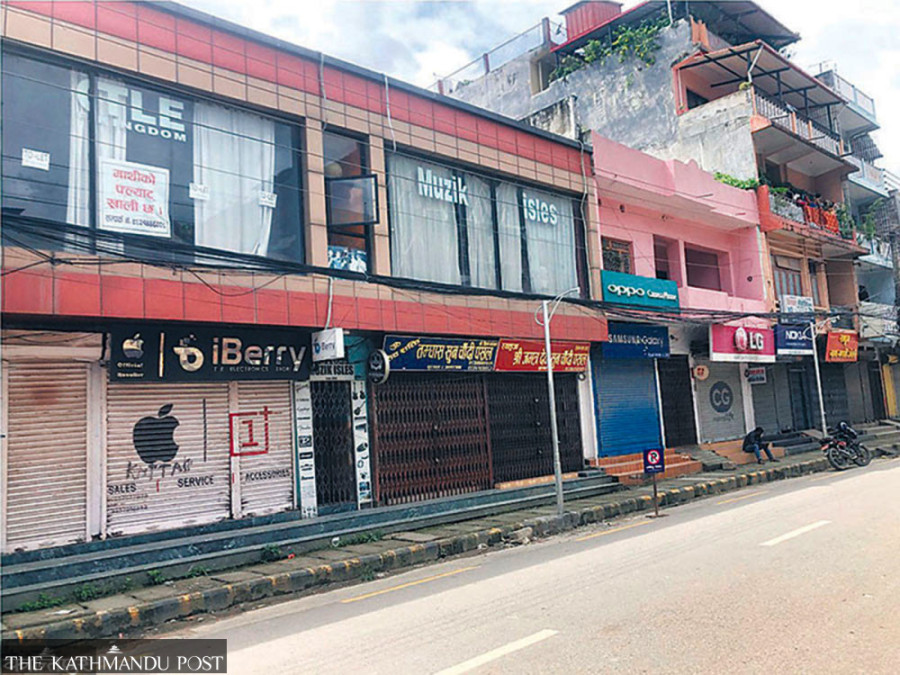Money
Traders flee as high interest rates and slow sales bite
There are more than a dozen commercial complexes in Butwal, and most of them are struggling to attract tenants.
Sanju Paudel
Sagun Shrestha was forced to shut down his fancy store Kamal Enterprises in Butwal last year, a casualty of the coronavirus pandemic.
He had opened the shop on Nepalgunj Road before Covid-19 when business was going great.
“From dawn to dusk, my store was always packed with customers. I used to supply clothes to traders in nearby districts like Palpa, Arghakhanchi and Gulmi too,” said Shrestha.
Business started slowing down after Covid-19 spread through the world and reached Nepal. But he was hopeful that the situation would improve after the pandemic ended.
The improvement he had hoped for never happened. Last year, he decided to shut down his store.
The sole breadwinner of the household says he is anxious about the future. “I am struggling to feed my family,” said Shrestha.
The pandemic precipitated a devastatingly sharp contraction of economic activity and huge job losses globally in early 2020.
Nepal’s economy shrank to a record low in 2020-21.
After making a strong rebound in 2021-22, growth again took a hit in the last fiscal year on a tighter monetary policy, higher international prices and continued import restrictions.
There was a large boom-bust credit cycle in Nepal’s financial sector. This means credit may have grown to excessive levels and borrowers' repayment capacity eroded due to higher lending rates.
Shrestha's business started to suffer as he was selling goods on credit and paying high bank interest. He said a majority of his customers didn’t pay their debts.
“Because of the high interest and steep rentals, I had no choice but to shut down,” said Shrestha.
His landlord Anil Shrestha said he had rented out two floors of his house to various businesses.
Sagun Shrestha's Kamal Enterprises and a mobile phone shop occupied the ground floor while a finance company rented the first floor.
Both floors are now vacant. The traders pulled down their shutters and left amid the economic slowdown.
“Without the rental income, I am also having a difficult time,” said Anil Shrestha.
He is unable to make the instalment payments to his bank from where he had borrowed money to build the house.
“My entire house is empty now,” said Shrestha.
Ramu Adhikari had spent Rs1.2 million to open Arghakhanchi Mobile Store in Butwal-11. He is another victim of the economic slowdown.
Last June, Adhikari held a clearance sale to sell off his entire inventory and shuttered his shop.
He had moved to Butwal from Arghakhanchi in 2015 to start a mobile repair shop. “I used to make Rs2,000 daily by repairing mobile phone sets,” said Adhikari.
His story is similar to Sagun Shrestha's.
“My customers, friends and relatives bought phones on credit. Many did not pay their debts, and my liabilities started piling up. So I finally decided to shut down the business.”
Adhikari is now preparing to go abroad in search of a decent job.
Pratyush Man Singh, proprietor of Singh Complex in Amarpath in Butwal-7, said that the prolonged economic slowdown was making life hard for traders.
“The economic crisis is more severe for business institutions,” said Singh.
“Before Covid, our Singh Complex was a centre of attraction and filled with customers. Now, only a few branches of banks and insurance companies are left.”
The once sleepy market town in the Tarai plains was thrust onto the international stage after becoming the gateway to the pilgrimage destination of Lumbini.
Proliferating factories and a rapidly spreading transportation network turned the Butwal-Bhairahawa metroplex into an economic powerhouse.
Lumbini, which attracts international pilgrims as the birthplace of the Buddha, has observed the construction of large-scale infrastructure including a bevy of luxury hotels after talk about the construction of an international airport began in 2010.
In May last year, Nepal opened its second international airport in the southern city of Bhairahawa but no international flights stop here.
The objective of building the international airport in Bhairahawa was to bring more tourists, energise business and generate jobs. But the situation is just the opposite. Traders are closing down their shops and moving abroad for decent jobs.
The number of Nepali workers obtaining approval for foreign employment reached 774,976 in the last fiscal year.
Singh, proprietor of Singh Complex, said he was unable to retain shops in the complex even after providing a hefty discount on the rent.
“I have made a huge investment to build the commercial complex. Now, it is difficult to operate it. People are more worried about their survival than buying new clothes and shoes,” Singh said.
There are more than a dozen commercial complexes in Butwal, and most of them are struggling to attract tenants.
Many traders in Amar Path, Bikash Path, BP Chowk, Traffic Chowk and other areas in the centre of Butwal have closed their businesses. Many shuttered shops sport "To Let" signs.
Bimal Raj Bhattarai, general secretary of the Butwal Chamber of Commerce and Industry, said that around one-fourth of the traders have left their businesses in the last few years.
Bhattarai said that high inflation, super high interest rates and low government expenditure have forced traders out of their business. When the government fails to spend, people's income drops, according to economists. And when people’s income drops, they don’t buy things.
The drop in farm incomes too has affected the market.
“The government should bail out traders by lowering the interest rate,” said Bhattarai.
“If the same situation continues for another year, there won’t be any traders left in the city to do business. No trade activities means no jobs and no revenue for the government,” he said.
“The government should resolve the ongoing crisis before it gets out of hand.”




 9.51°C Kathmandu
9.51°C Kathmandu















